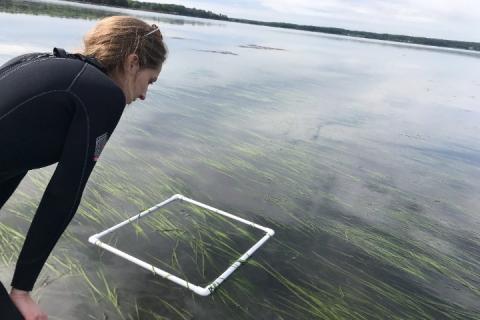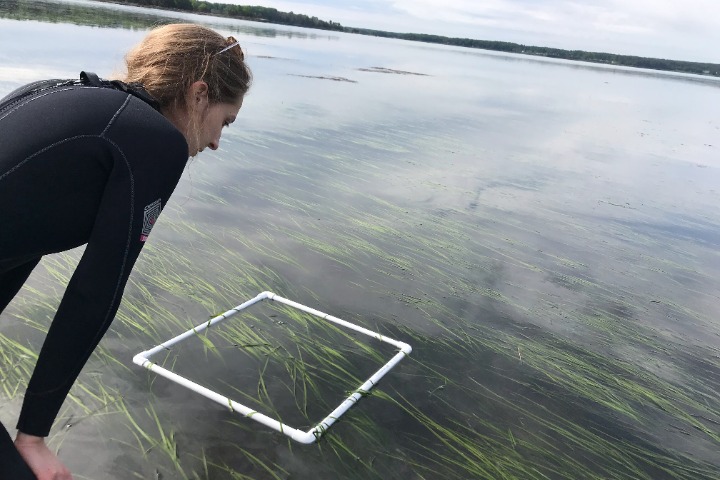
An interdisciplinary effort to examine eelgrass health has increased trust among partners and inspired ideas for new management strategies by municipalities and state agencies.
The Project
Eelgrass (Zostera marina) has been declining in Great Bay Estuary, New Hampshire over the past 20 years. Eelgrass has long been considered an indicator of estuarine health since declines in its distribution usually signal detrimental change in water quality. The sustained decline in eelgrass in Great Bay led the Environmental Protection Agency (EPA) to issue a Total Nitrogen General Permit in 2020 to curb both point and nonpoint sources of nitrogen (N) input in the Bay. Thanks to significant upgrades to wastewater treatment plants, nitrogen inputs have been declining. This project sought to determine whether those reductions improved eelgrass health or resulted in positive feedback that enhanced the resilience of eelgrass in Great Bay Estuary.
Building on existing regional collaborations, this project explored connections between eelgrass health, water quality, and water flow patterns in Great Bay. The project team combined hydrodynamic modeling and new field observations to examine potential stressors of eelgrass, including water residence time, nitrogen loading, in situ nitrogen processing, sediment dynamics, and light availability. A Project Advisory Committee made up of individuals from 14 organizations was formed to provide input to the project team and to ensure results were relevant, trusted, and useful within the current management context.
The project’s hydrodynamic modeling found that Great Bay may be more sensitive to nitrogen loading than previously thought, because water can “reside” in the Bay far longer than expected. The project results also emphasized the need to prioritize sediment management along with nitrogen management. The project produced a wealth of resources, including a comprehensive technical report and an interactive story map. Project outcomes are directly informing adaptive management plans developed by communities, as well as future modifications to the EPA permit requirements. The momentum and funding from this project has also inspired several educational products associated with Great Bay NERR, including a new eelgrass exhibit, traveling education trunks for teacher classrooms, and a “Teachers on the Estuary” Workshop focused on eelgrass.
The Impact
- Built a shared understanding among regional partners of Great Bay hydrodynamics and the factors that influence eelgrass health in Great Bay.
- Jointly developed a foundation for further discussions on nitrogen and sediment management, and for the future development of a Total Maximum Daily Load (TMDL).
- Inspired ideas for improved nitrogen monitoring protocol for municipalities and state agencies.
- Increased trust in best available science of eelgrass and deepened collaborative relationships.
- Increased interest and literacy about estuarine health amongst families in the watershed.


